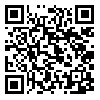Volume 12, Issue 1 (Winter 2024)
PCP 2024, 12(1): 53-66 |
Back to browse issues page
Download citation:
BibTeX | RIS | EndNote | Medlars | ProCite | Reference Manager | RefWorks
Send citation to:



BibTeX | RIS | EndNote | Medlars | ProCite | Reference Manager | RefWorks
Send citation to:
Farzin M, Amiri Majd M, Ghamari M. Comparing the Effectiveness of Guided Imagery and Lazarus Multimodal Therapy on COVID-19 Anxiety and Life Expectancy in People Recovered From COVID-19. PCP 2024; 12 (1) :53-66
URL: http://jpcp.uswr.ac.ir/article-1-899-en.html
URL: http://jpcp.uswr.ac.ir/article-1-899-en.html
1- Department of Counseling, Faculty of Humanity, Abhar Branch, Islamic Azad University, Abhar, Iran.
2- Department of Counseling, Faculty of Humanity, Abhar Branch, Islamic Azad University, Abhar, Iran. ,mo.Amiri@iau.ac.ir
2- Department of Counseling, Faculty of Humanity, Abhar Branch, Islamic Azad University, Abhar, Iran. ,
Abstract: (3439 Views)
Objective: Given the well-established and irreversible psychological consequences associated with the COVID-19 disease, it becomes imperative to develop interventions tailored to address these effects and comprehensively evaluate their efficacy in promoting the mental well-being of individuals who have successfully recuperated from COVID-19. The current investigation primarily ascertained and juxtaposed the efficacy of guided imagery and Lazarus multimodal therapy in alleviating COVID-19-induced anxiety and enhancing life expectancy among post-COVID-19 patients
Methods: The present study employed a semi-experimental design, encompassing the objectives, application, and research methodology. Specifically, a pre-test-post-test design with a control group was utilized, incorporating a three-month follow-up period. The statistical population comprised individuals who had recovered from COVID-19 and were residing in Tehran City, Iran, in 2021. Participants were selected from various government hospitals in Tehran who received treatment for COVID-19. A total of 45 participants were randomly assigned into three groups: the guided imagery group (15 participants), the Lazarus multimodal therapy group (15 participants), and the control group (15 participants), using the lottery method. The experimental groups underwent 10 sessions of 90 minutes each, wherein guided imagery and Lazarus multimodal therapy interventions were respectively administered. The control group did not receive any form of training or intervention. The research instruments employed in this study were the COVID-19 Anxiety Questionnaire (CDAS, 2020) developed by Alipour, Gadami, Alipour, and Abdulzadeh, and Miller’s Life Expectancy Questionnaire (MLEQ, 1998). Data were analyzed using covariance analysis in SPSS software, version 26. Inferential analysis was performed with alpha 0.05
Results: The findings of the study revealed that both guided imagery and Lazarus multimodal therapy demonstrated effectiveness in mitigating COVID-19 anxiety (F=11.16, P=0.000) and enhancing life expectancy (F=5.49, P=0.008) among individuals who had recovered from COVID-19 (P<0.05). Furthermore, no significant difference was observed between the effects of these interventions on the aforementioned variables.
Conclusion: Based on the research findings, the educational packages developed in this study hold the potential for utilization in reducing COVID-19 anxiety and enhancing life expectancy among individuals amidst the ongoing pandemic outbreak. These packages offer valuable resources for addressing and managing anxiety related to COVID-19, thereby contributing to improved psychological well-being and overall life expectancy during this challenging period.
Methods: The present study employed a semi-experimental design, encompassing the objectives, application, and research methodology. Specifically, a pre-test-post-test design with a control group was utilized, incorporating a three-month follow-up period. The statistical population comprised individuals who had recovered from COVID-19 and were residing in Tehran City, Iran, in 2021. Participants were selected from various government hospitals in Tehran who received treatment for COVID-19. A total of 45 participants were randomly assigned into three groups: the guided imagery group (15 participants), the Lazarus multimodal therapy group (15 participants), and the control group (15 participants), using the lottery method. The experimental groups underwent 10 sessions of 90 minutes each, wherein guided imagery and Lazarus multimodal therapy interventions were respectively administered. The control group did not receive any form of training or intervention. The research instruments employed in this study were the COVID-19 Anxiety Questionnaire (CDAS, 2020) developed by Alipour, Gadami, Alipour, and Abdulzadeh, and Miller’s Life Expectancy Questionnaire (MLEQ, 1998). Data were analyzed using covariance analysis in SPSS software, version 26. Inferential analysis was performed with alpha 0.05
Results: The findings of the study revealed that both guided imagery and Lazarus multimodal therapy demonstrated effectiveness in mitigating COVID-19 anxiety (F=11.16, P=0.000) and enhancing life expectancy (F=5.49, P=0.008) among individuals who had recovered from COVID-19 (P<0.05). Furthermore, no significant difference was observed between the effects of these interventions on the aforementioned variables.
Conclusion: Based on the research findings, the educational packages developed in this study hold the potential for utilization in reducing COVID-19 anxiety and enhancing life expectancy among individuals amidst the ongoing pandemic outbreak. These packages offer valuable resources for addressing and managing anxiety related to COVID-19, thereby contributing to improved psychological well-being and overall life expectancy during this challenging period.
Keywords: Guided imagery, Lazarus multimodal therapy, COVID-19 anxiety syndrome, Life expectancy, People recovered from COVID-19
Type of Study: Original Research Article |
Subject:
Cognitive behavioral
Received: 2023/06/28 | Accepted: 2023/09/13 | Published: 2024/01/1
Received: 2023/06/28 | Accepted: 2023/09/13 | Published: 2024/01/1
| Rights and permissions | |
 |
This work is licensed under a Creative Commons Attribution-NonCommercial 4.0 International License. |








